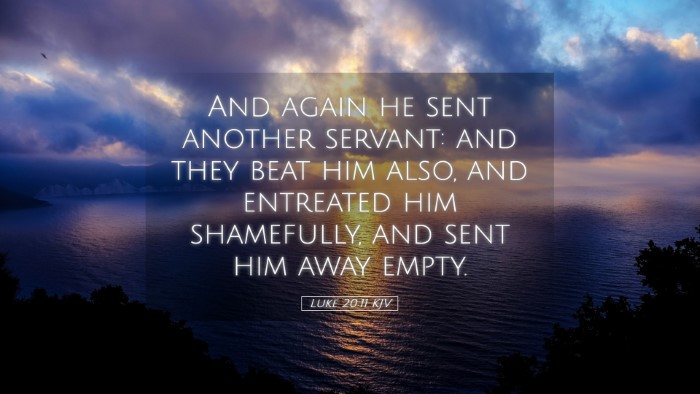Bible Commentary on Luke 20:11
Verse: "And again he sent a third: and they wounded him also, and cast him out." (Luke 20:11, KJV)
Contextual Background
The parable of the wicked husbandmen in Luke 20 is a significant teaching moment in Jesus’s ministry, highlighting the rejection of prophetic voices throughout Israel’s history. To understand verse 11, it is essential to consider the context of Jesus’s confrontation with religious leaders in Jerusalem shortly before His crucifixion.
Exegesis and Insights
This verse demonstrates a repeated pattern of rejection by the husbandmen (representing Israel’s leaders) who are sent various messengers (prophets), culminating in the sending of the Son (representing Jesus Himself).
-
Messengers and Prophets:
Matthew Henry highlights the historical context of prophets sent by God throughout the Old Testament, underscoring their mistreatment. Each messenger represents God's ongoing desire for relationship, even in the face of persistent rejection from His people.
-
The Third Messenger:
Albert Barnes points out that sending a third messenger signifies God's patience and mercy. The wounds inflicted upon him symbolize the physical and spiritual scars that come from rejection. This illustrates the tragic outcome of ignoring divine instruction and guidance.
-
Symbolism of Wounding and Casting Out:
Adam Clarke comments on the profound implications of "wounded" and "cast out." The act of wounding denotes not only physical violence but a deeper spiritual offense against God's authority. "Casting out" signifies a complete rejection of God's emissary, which Clarke correlates to the rejection of Christ Himself.
Theological Implications
Luke 20:11 serves as a sobering reminder of humanity's tendency to resist divine truth. The parallelism within the passage not only addresses the historical rejection but also poses a question for contemporary readers: How do we respond to God's message today?
-
Human Rebellion:
This verse emphasizes humanity's inclination toward rebellion against divine authority. The persistent mistreatment of prophets is a reflection of a broader theme found throughout Scripture—that of human sinfulness and the need for redemption.
-
God’s Long-suffering:
The sending of multiple messengers illustrates God’s long-suffering nature. Even when faced with rejection, He persists in His desire to bring about reconciliation with His people. Theological reflections from Henry amplify the notion of God's grace and patience.
-
Christ as the Ultimate Messenger:
The climax of rejection comes with the sending of the Son. This underscores the seriousness of the situation. According to Barnes, the repeated pattern leads to a critical moment where God is compelled to judge His wayward people, heralding a solemn conclusion to the parable.
Application for Today’s Believers
As contemporary believers engage with Luke 20:11, it calls for introspection regarding the response to God's messages in our lives. The warnings conveyed through Scripture press on us to evaluate our openness to divine communication.
-
Openness to God’s Correction:
Just as the husbandmen rejected the messengers, believers today must guard against dismissing God's correction or the call to repentance through various means—whether sermons, counsel from others, or personal study.
-
Faithfulness in Ministry:
For pastors and leaders, this verse serves as a reminder of the challenges faced in ministry. The faithful proclamation of God's Word, regardless of how it is received, must remain a priority, reflecting God's persistent love for His people.
-
Awareness of Spiritual Blindness:
Spiritual blindness leads to the rejection of truth. Believers are called to self-examine and cultivate sensitivity towards the Holy Spirit’s leading, ensuring that we do not repeat the mistakes illustrated in this parable.
Conclusion
Luke 20:11 encapsulates the tragic cycle of rejection faced by God's messengers, culminating in the rejection of Christ. As we meditate on this passage, may we be encouraged to heed God's voice, embrace repentance, and be willing vessels for His message to a world that often resists the truth.


